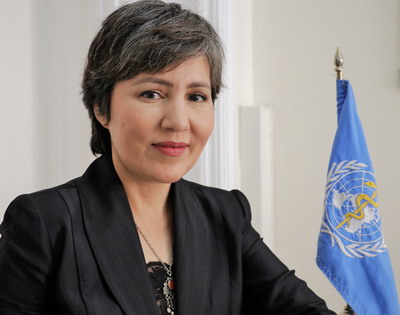 WHO Representative Dr Akjemal Magtymova7 April 2021 – The COVID-19 pandemic has devastated us all. However, the harshest impact has been on people already experiencing inequities because of poverty, gender, ethnicity, education, occupation, migrant status, disability, and discrimination. In conflict-hit Syria, people are disproportionately vulnerable to exposure to the disease in the context of fragile health systems, they lack access to health services and are heavily impacted by economic consequences of the pandemic. Access to COVID-19 vaccines to reduce ongoing transmission is yet another mammoth task for Syria.
WHO Representative Dr Akjemal Magtymova7 April 2021 – The COVID-19 pandemic has devastated us all. However, the harshest impact has been on people already experiencing inequities because of poverty, gender, ethnicity, education, occupation, migrant status, disability, and discrimination. In conflict-hit Syria, people are disproportionately vulnerable to exposure to the disease in the context of fragile health systems, they lack access to health services and are heavily impacted by economic consequences of the pandemic. Access to COVID-19 vaccines to reduce ongoing transmission is yet another mammoth task for Syria.
COVID-19 is not the only health issue that gravely affects people in Syria, 12.4 million of whom need health aid. The efforts of the World Health Organization (WHO) through its country presence are specifically focused to protect, promote and improve health for all people in Syria by addressing inequalities.
Syria is part of the WHO’s Eastern Mediterranean Region, where most of the global causalities from health emergencies occur.
In addition to fatalities, the conflict in Syria continues to cause high rates of disability, communicable and noncommunicable diseases and mental health disorders. Peace is a prerequisite for health, in the absence of which the existing inequities are exacerbated, adversely affecting all aspects of the social determinants of health, including basic human rights, availability of health services, education, employment, income, social protection, shelter, water and sanitation. Furthermore, inequalities are closely interlinked with migration and the weak governance systems.
WHO uses a health systems approach to deliver health services. The essential building blocks of the health system include health infrastructure, health workforce, medicines and supplies, health information, health financing and governance. While governance, systems, institutions and society are the key for self-reliance and resilience, the humanitarian-development nexus and institution-building are conditional to peace processes and a political solution.
To save lives, Syria needs a functional health system and to focus on 4 priority areas.
First, the capacity for public health surveillance and detection is limited.
This requires strengthening the surveillance systems for emerging and remerging threats, as well as laboratory capacities to effectively provide epidemiological evidence, generate predictions and manage risk, especially in the current context.
Second, Syria needs functioning health facilities so that people can go to health facilities for care and treatment. The destruction caused to health infrastructure over a decade of conflict is enormous, hospitals being affected the most with only half fully functioning. Some governorates and populations are being affected most. For example, in northeast Syria, out of 16 public hospitals, only 1 is fully functioning and 3 are partially functioning. It is a massive challenge to ensure the adequate number of hospital beds in intensive care units, in the wake of the third wave of COVID-19 in Syria.
Third, health workers are the backbone of the health system. With only half of the health care workforce remaining in the country, medical personnel struggle to cope with the overwhelming health needs. We need to invest in the health workforce.
Fourth, it is important to ensure adequate supplies of essential medicines for a minimum of 60 days as part of the national stockpile. Economic impact has affected the hike in the cost of locally produced medicines, making it unaffordable for people and unprofitable for producers, thus limiting access to medicines to millions of people in Syria in these critical times.
To build back a fairer and healthier future for people of Syria, our collective efforts should prioritize the social determinants of health, equity in health and dignified lives. We must also highlight and mitigate the negative impacts of sanctions on health. We should reduce social inequities, protect human rights, improve gender equality and build resilient communities.
WHO’s vision is to achieve Health for All. As we mark World Health Day, together with partners, we strive to create conditions that allow people to fulfil their health potential and to overcome barriers that prevent women, men and children from accessing quality health services and ensure that those services are available everywhere and to everyone. Our highest priority now is to ensure equitable access to COVID-19 vaccines to protect health and frontline workers and to combat the pandemic.




